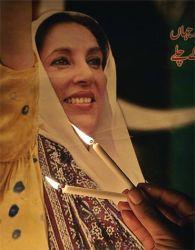 | « Back to article | Print this article |
 Pakistani investigators will grill former military ruler Pervez Musharraf about a "threatening" phone call and email to Benazir Bhutto after an anti-terrorism court on Thursday ordered to include him in the probe into ex-premier's assassination in 2007.
Pakistani investigators will grill former military ruler Pervez Musharraf about a "threatening" phone call and email to Benazir Bhutto after an anti-terrorism court on Thursday ordered to include him in the probe into ex-premier's assassination in 2007.
Judge Chaudhry Habib-ur-Rehman of the Rawalpindi-based anti-terrorism court accepted a request from prosecutors to question Musharraf and to include him in the investigation into the 2007 assassination.
Special prosecutor Chaudhry Zulfiqar Ali of the Federal Investigation Agency told PTI that a joint investigation team will question Musharraf on two issues – making a threatening phone call to Bhutto and sending an email that warned her not to return to Pakistan, and failing to provide adequate security to Bhutto after she came back from self-exile in 2007.
Musharraf's failure to provide adequate security to Bhutto "indirectly facilitated and helped terrorists in executing their plan to murder" her, Ali said.
Musharraf will also be quizzed on why he did not respond to five letters from Bhutto seeking foolproof security ahead of her return to Pakistan.
"Musharraf provided foolproof security to other leaders like (then) Prime Minister Shaukat Aziz but ignored Benazir," he said.
Ali, who is part of the joint investigation team, said Musharraf will be questioned at his farmhouse on the outskirts of Islamabad, which has been declared a 'sub-jail'.
He said: "We had requested the anti-terrorism court to let Musharraf stay in (the farmhouse) because of security issues and the court accepted our plea."
The joint investigation team is expected to complete questioning Musharraf by May 3.
"We will complete the challan (chargesheet) after investigating him by May 3 and submit the same in the anti-terrorism court," Ali said.
Bhutto was assassinated by a suicide bomber after addressing an election rally in Rawalpindi in December 2007.
Earlier, the FIA requested the anti-terrorism court to include Musharraf in the probe a day after the Rawalpindi bench of the Lahore high court cancelled the former military\ ruler's interim bail in the assassination case.
"The court gave FIA's joint investigation team permission to include Musharraf in the investigation and to arrest him," Ali told reporters outside the court.
"In view of security threats to the accused, the investigation is to be done at the sub-jail," he said, referring to the decision by authorities to detain Musharraf at his farmhouse because of threats to his life.
Ali said Musharraf would be presented in the anti-terrorism court on Friday.
The joint investigation team will decide whether to seek physical or judicial custody of Musharraf, he said.
Legal experts said the FIA was completing formalities to include Musharraf in the probe and it was unlikely he would be moved from his farmhouse.
The high court’s decision on Wednesday to reject Musharraf's request to extend his interim bail over Bhutto's assassination added to the legal woes of the ex-army chief, who is facing several serious criminal cases.
Lawyers have petitioned the Supreme Court to put him on trial for treason for imposing emergency in 2007 and he faces charges over the death of Baloch leader Akbar Bugti in a 2006 military operation.
The 69-year-old former military ruler was arrested last week after the Islamabad High Court revoked his bail in a case related to the detention of over 60 judges during the 2007 emergency.
Musharraf returned to Pakistan last month after nearly four years of self-exile, promising to "save" the country from economic ruin and militancy.
However, he was barred from running in the May 11 general election, which will mark the first democratic transition of power in Pakistan’s history.